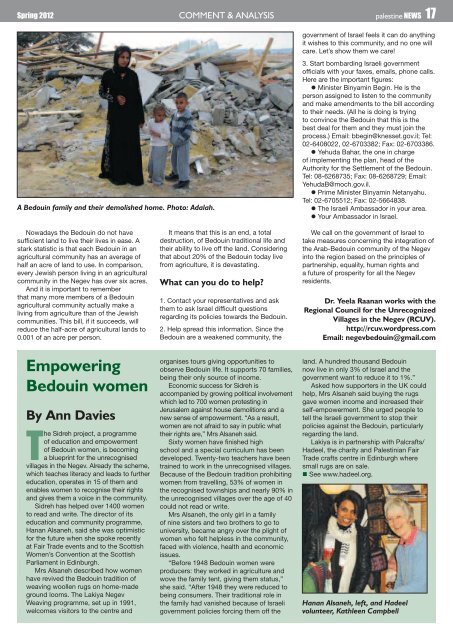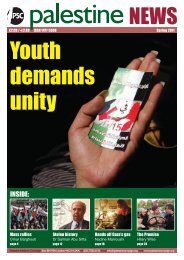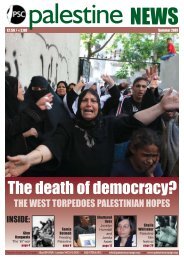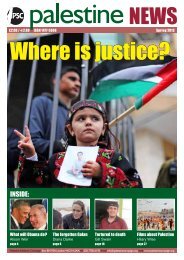World demands - Palestine Solidarity Campaign
World demands - Palestine Solidarity Campaign
World demands - Palestine Solidarity Campaign
Create successful ePaper yourself
Turn your PDF publications into a flip-book with our unique Google optimized e-Paper software.
Spring 2012 COMMENT & ANALYSISpalestine NEWS 17government of Israel feels it can do anythingit wishes to this community, and no one willcare. Let’s show them we care!A Bedouin family and their demolished home. Photo: Adalah.3. Start bombarding Israeli governmentofficials with your faxes, emails, phone calls.Here are the important figures:• Minister Binyamin Begin. He is theperson assigned to listen to the communityand make amendments to the bill accordingto their needs. (All he is doing is tryingto convince the Bedouin that this is thebest deal for them and they must join theprocess.) Email: bbegin@knesset.gov.il; Tel:02-6408022, 02-6703382; Fax: 02-6703386.• Yehuda Bahar, the one in chargeof implementing the plan, head of theAuthority for the Settlement of the Bedouin.Tel: 08-6268735; Fax: 08-6268729; Email:YehudaB@moch.gov.il.• Prime Minister Binyamin Netanyahu.Tel: 02-6705512; Fax: 02-5664838.• The Israeli Ambassador in your area.• Your Ambassador in Israel.Nowadays the Bedouin do not havesufficient land to live their lives in ease. Astark statistic is that each Bedouin in anagricultural community has an average ofhalf an acre of land to use. In comparison,every Jewish person living in an agriculturalcommunity in the Negev has over six acres.And it is important to rememberthat many more members of a Bedouinagricultural community actually make aliving from agriculture than of the Jewishcommunities. This bill, if it succeeds, willreduce the half-acre of agricultural lands to0.001 of an acre per person.EmpoweringBedouin womenBy Ann DaviesThe Sidreh project, a programmeof education and empowermentof Bedouin women, is becominga blueprint for the unrecognisedvillages in the Negev. Already the scheme,which teaches literacy and leads to furthereducation, operates in 15 of them andenables women to recognise their rightsand gives them a voice in the community.Sidreh has helped over 1400 womento read and write. The director of itseducation and community programme,Hanan Alsaneh, said she was optimisticfor the future when she spoke recentlyat Fair Trade events and to the ScottishWomen’s Convention at the ScottishParliament in Edinburgh.Mrs Alsaneh described how womenhave revived the Bedouin tradition ofweaving woollen rugs on home-madeground looms. The Lakiya NegevWeaving programme, set up in 1991,welcomes visitors to the centre andIt means that this is an end, a totaldestruction, of Bedouin traditional life andtheir ability to live off the land. Consideringthat about 20% of the Bedouin today livefrom agriculture, it is devastating.What can you do to help?1. Contact your representatives and askthem to ask Israel difficult questionsregarding its policies towards the Bedouin.2. Help spread this information. Since theBedouin are a weakened community, theorganises tours giving opportunities toobserve Bedouin life. It supports 70 families,being their only source of income.Economic success for Sidreh isaccompanied by growing political involvementwhich led to 700 women protesting inJerusalem against house demolitions and anew sense of empowerment. “As a result,women are not afraid to say in public whattheir rights are,” Mrs Alsaneh said.Sixty women have finished highschool and a special curriculum has beendeveloped. Twenty-two teachers have beentrained to work in the unrecognised villages.Because of the Bedouin tradition prohibitingwomen from travelling, 53% of women inthe recognised townships and nearly 90% inthe unrecognised villages over the age of 40could not read or write.Mrs Alsaneh, the only girl in a familyof nine sisters and two brothers to go touniversity, became angry over the plight ofwomen who felt helpless in the community,faced with violence, health and economicissues.“Before 1948 Bedouin women wereproducers: they worked in agriculture andwove the family tent, giving them status,”she said. “After 1948 they were reduced tobeing consumers. Their traditional role inthe family had vanished because of Israeligovernment policies forcing them off theWe call on the government of Israel totake measures concerning the integration ofthe Arab-Bedouin community of the Negevinto the region based on the principles ofpartnership, equality, human rights anda future of prosperity for all the Negevresidents.Dr. Yeela Raanan works with theRegional Council for the UnrecognizedVillages in the Negev (RCUV).http://rcuv.wordpress.comEmail: negevbedouin@gmail.comland. A hundred thousand Bedouinnow live in only 3% of Israel and thegovernment want to reduce it to 1%.”Asked how supporters in the UK couldhelp, Mrs Alsaneh said buying the rugsgave women income and increased theirself-empowerment. She urged people totell the Israeli government to stop theirpolicies against the Bedouin, particularlyregarding the land.Lakiya is in partnership with Palcrafts/Hadeel, the charity and Palestinian FairTrade crafts centre in Edinburgh wheresmall rugs are on sale.• See www.hadeel.org.Hanan Alsaneh, left, and Hadeelvolunteer, Kathleen Campbell







